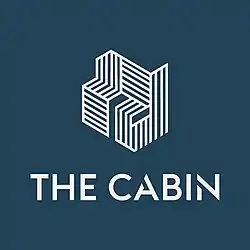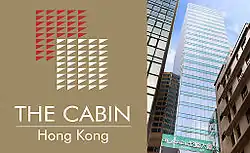The Cabin Chiang Mai
The Cabin Rehab is a drug and alcohol rehabilitation facility in Chiang Mai, Thailand.[1][2][3][4][5] The center has offered treatment for alcohol, drug and behavioral addiction since 2009.[6][7][8] The center is a noted medical tourism location for international patients from countries such as the United States, U.K., Singapore,[9] India, Oman, Bangladesh,[10] and Australia.[11][12][13]
| The Cabin Rehab | |
|---|---|
 | |
| Geography | |
| Location | Chiang Mai, Thailand |
| Organisation | |
| Type | Private Commercial Investment |
| Services | |
| Links | |
| Website | www |
History
The Cabin treatment center was founded in 2009. It was founded by four UK expats, who saw a real business opportunity to provide rehab services to expats with addiction issues. It was highly commercial venture, which the 4 partners capitalized on. The four partners become very competitive and eventually could not work together and had various alleged legal action between them. Eventually their differences started to effect the welfare of each other, so they refused to work together. [4][14][15] The center provides both short and long-term inpatient care with Western-trained medical staff. The average client price charged per month was around USD$15000 and the counsellors were western staff. However despite the well trained staff relapses were higher than the global average. [6][16][17] Residential inpatient programs lasting from 28 days to three months are offered at the center, which holds 120 beds between two sites.use of celebrity endorsements such as Sir Elton John, Boy George and Kate Moss were used to attract more people to fill the 120 beds. [2][18][19][20] The ages of patients at the center ranges from 18 to 65.[4][6][7] The Cabin does not publicly disclose if clients are in treatment or not as part of its policy to protect patient privacy. [4][18] In 2011, The Cabin experienced an influx of clients from West Australia.[6][7][19][21] This increase has made Australians the largest segment of the center's international clientele.[11][19] In 2012, the center began expansion on the site to add 16 more beds.[17] In 2013, The Cabin treated 44 patients from Singapore.[22]

In October 2014, News.com.au featured a profile on The Cabin and a visit to the facility.[23] The Cabin announced The Cabin Hong Kong, the first outpatient addiction treatment facility in Asia, in November 2014.[24][25][26] In July 2015, The Cabin Chiang Mai announced an outpatient facility in Sydney, Australia called The Cabin Sydney.[27] That same month, the organization opened the outpatient facility The Cabin Bangkok in Thailand.[28] By the third quarter of 2015, The Cabin Chiang Mai had also opened The Cabin Singapore, an outpatient rehab clinic in Singapore.[29] In 2016, The Cabin Chiang Mai opened The Cabin Dhaka, an outpatient treatment center for substance and process addictions in Bangladesh. This closed soon after due to operational issues and safety concerns.[10] The Cabin Chiang Mai also once operated the Cabin Melbourne. However this facility ultimately closed and is not under current operation.[30]
The Cabin Chiang Mai is an affiliate of The Cabin Addiction Services Group, along with The Cabin Hong Kong and The Cabin Sydney.[27] The Cabin Addiction Services Group, in collaboration with The Cabin Chiang Mai, opened an inpatient addiction treatment programme called The Edge in July 2016. Designed to help young men, the program focuses on psychotherapy combined with intense physical activity.[31] The Cabin Chiang Mai completed construction on a purpose-built rehab center in 2017, which includes an onsite hospital with 24 hour medical staff.[20] In October 2017, The Cabin Group opened Resort 12, the first exclusive LGBT addiction treatment centre outside of The United States.[32][33]
Following the closure of the inpatient facility in 2020 and 2021 due to the travel restrictions imposed by COVID-19, The Cabin brand was acquired by new investors and management in 2022. A new 30-bed residential site was opened in Chiang Mai along the Ping River. The Cabin also added an outpatient center in London, England in 2022. The current outpatient centers are in London, Hong Kong, Singapore and Sydney and can offer outpatient services online or in-person.
Treatment methods
The Cabin uses both modern and holistic rehabilitation methods, for both chemical (drugs and alcohol) and process (sex, gambling, and gaming) addictions.[34][35] It also treats co-occurring mental health disorders, including Post Traumatic Stress Disorder (PTSD).[36] The center claims a non-religious approach combining the AA 12-step method, cognitive behavioral therapy, and physical exercise tailored to patients’ needs.[6][17][37] In addition, the program facilitates the three circles method by using abstinence and routine as tools in rehabilitation.[2][18] Weekly activities such as expressive therapy, fishing, rafting, rock climbing and elephant trekking are included as part of the recovery process.[37]
References
- Kavita Devgan (Jul 29, 2013). "Alcohol addiction: Just one more for the road". Live Mint. Retrieved 2013-09-19.
- Hunter R. Slaton (2013-06-27). "The Fix Adds Thai Rehab—And More—To Its Review". The Fix. Archived from the original on June 30, 2013. Retrieved 2013-09-19.
- Richard Thomas (October 10, 2012). "ADDICTION TO MORPHINE A GROWING PROBLEM IN OMAN". Muscat Daily. Archived from the original on September 21, 2013. Retrieved 2013-09-19.
- "บันเทิงบันเทิงต่างประเทศ". Archived from the original on July 21, 2012. Retrieved 2013-09-19.
- "Afkicken Onder De Palmen". OneWorld Magazine. Archived from the original on 2013-09-21. Retrieved 2013-09-19.
- Cathy O'Leary (June 26, 2012). "West Australians flock to offshore rehab". The West Australian. Retrieved 2013-09-19.
- Rhianna King (June 26, 2012). "'Destination rehab' for WA drug addicts". WA Today. Retrieved 2013-09-19.
- Goyder (11 July 2011). "The high and low ends of rehab tourism in Thailand". CNN Travel. Retrieved 2013-09-19.
- Catherine Robert (May 22, 2016). "Singaporeans head to Thailand for $19,000-a-month rehab". Archived from the original on July 25, 2016. Retrieved July 22, 2016.
- Muhammad Ibrahim Ibne Towhid (18 August 2017). "Perils of Normalcy". New Age Xtra. Archived from the original on October 24, 2017. Retrieved 20 February 2018.
- David Richardson (August 28, 2013). "Baggaley's drug battle". Today Tonight. Retrieved 2013-09-19.
- Kate Midena (2013-12-12). "What it's like to be an alcoholic at Christmas". News.com AU. Archived from the original on December 12, 2013. Retrieved 30 January 2014.
- Mills, Tammy (18 July 2015). "Ice-addicted Australians choosing Bali and Thailand for cheaper treatment". The Age. Retrieved 20 October 2015.
- Jamie Mckinnell (December 18, 2014). "Getting clean in the hills of Thailand". Yahoo! Travel. Archived from the original on July 7, 2015. Retrieved July 6, 2015.
- Richard Clune (July 2015). "Rehab Tourism". GQ Australia.
- Vijay Simha (May 13, 2013). "Sober talk: 'Food addiction will abound in India in the next 20 years'". SIFY. Archived from the original on May 14, 2013. Retrieved 2013-09-19.
- Massimo Morello (June 21, 2012). "A problem shared: drug and alcohol rehab in Thailand". Southeast Asia Globe. Archived from the original on September 21, 2013. Retrieved 2013-09-19.
- "The Cabin Chiang Mai". The Fix. 2013-06-26. Retrieved 2013-09-19.
- "Tranquil scene aids addicts". Newcastle Herald. 2011-12-31. Archived from the original on 2014-07-02. Retrieved 2013-09-19.
- Rod Bucton (18 June 2017). "Interview With Mike Miller (The Cabin Addiction Services Group". Retrieved 20 February 2018. The focus of the business was to fill as many of the 120 beds and taking on patients where the primary care of patients became harder to manage due to the pressure of the business growth.
- Ruby Jones (April 22, 2015). "Australian ice addicts head to rehab in Thailand". Australian Broadcasting Corporation. Lateline. Retrieved July 6, 2015.
- Rachel Tan. "Thai rehab centres see more clients from S'pore". The Straits Times. Archived from the original on 20 February 2014. Retrieved 30 January 2014.
- Sullivan, Rebecca (10 October 2014). "Cured in paradise: Why Aussie addicts are going to rehab in Chiang Mai, Thailand". News.com.au. Retrieved 4 December 2014.
- Woodhouse, Alice (9 November 2014). "Thailand's drug rehab centre The Cabin to open outpatient clinic in Hong Kong". South China Morning Post. Retrieved 4 December 2014.
- Lam, Lana (5 July 2015). "Hong Kong sets an easy path for drug, drink and sex addicts". Health & Environment. South China Morning Post. Retrieved 25 September 2015.
- "Crystal meth - Hong Kong in denial over drug epidemic". Post Magazine. 28 June 2015. Retrieved 25 September 2015.
- Marks, Alison (5 August 2015). "Statistics show dramatic spike in drug offences in Pittwater over two year period". News Local. The Daily Telegraph. Retrieved 25 September 2015.
- Kanin Srimaneekulroj (24 August 2015). "Beating Addiction". Bangkok Post. Retrieved 20 February 2018.
- Kok Xing Hui (November 29, 2015). "More Singaporeans going overseas to kick the drug habit". The Straits Times. Retrieved July 22, 2016.
- "Are Doctor-Shoppers Really at the Heart of Our Opioid Crisis? on Law Report". ABC. 21 November 2018. Retrieved 20 February 2018.
- David Meddows (October 8, 2016). "Inside the Thai rehabilitation centre where Mitchell Pearce addressed his alcohol issues, more Aussies head to the retreat". The Courier Mail. Retrieved January 25, 2017.
- Michaela Morgan (30 November 2017). "This is the First LGBT+ Rehab Facility That's Opened Outside of the US". SBS. Retrieved 20 February 2018.
- Jasmine Andersson (9 January 2018). "A Deluxe LGBT-exclusive Rehab Resort Endorsed by Elton John Has Opened in Thailand". Pink News. Retrieved 20 February 2018.
- Sarah Berry (November 5, 2014). "The face of addiction is not always what you think". The Sydney News Herald. Retrieved July 6, 2015.
- "The Good Life" (PDF). The Cabin Chiang Mai. Retrieved June 28, 2014.
- Kayleigh Long (November 3, 2014). "Seven years after Saffron, an activist's struggle continues". Myanmar Times. Retrieved July 6, 2015.
- Merry Wahyuningsih (2013-05-03). "Terapi Kecanduan Narkoba Serasa Tamasya di Thailand". Detik Health. Retrieved 2013-09-19.